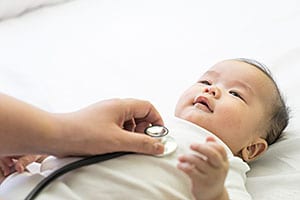Symptoms and Care
Symptoms

People infected with RSV usually show symptoms within 4 to 6 days after getting infected. Symptoms of RSV infection usually include
- Runny nose
- Decrease in appetite
- Coughing
- Sneezing
- Fever
- Wheezing
These symptoms usually appear in stages and not all at once. In very young infants with RSV, the only symptoms may be irritability, decreased activity, and breathing difficulties.
Almost all children will have had an RSV infection by their second birthday.
Call your healthcare professional if you or your child is having difficulty breathing, not drinking enough fluids, or experiencing worsening symptoms.
Care
Antiviral medication is not routinely recommended to fight infection. Most RSV infections go away on their own in a week or two. However, RSV can cause severe illness in some people.
Take steps to relieve symptoms
- Manage fever and pain with over-the-counter fever reducers and pain relievers, such as acetaminophen or ibuprofen. (Never give aspirin to children.)
- Drink enough fluids. It is important for people with RSV infection to drink enough fluids to prevent dehydration (loss of body fluids).
- Talk to your healthcare provider before giving your child nonprescription cold medicines. Some medicines contain ingredients that are not good for children.
RSV can cause more serious health problems
Infants, young children and older adults are at increased risk of severe RSV. Learn about preventive options.
RSV can also cause more severe infections such as bronchiolitis, an inflammation of the small airways in the lung, and pneumonia, an infection of the lungs. It is the most common cause of bronchiolitis and pneumonia in children younger than 1 year of age.
Healthy adults and infants infected with RSV do not usually need to be hospitalized. But some people with RSV infection, especially older adults and infants younger than 6 months of age, may need to be hospitalized if they are having trouble breathing or are dehydrated. In the most severe cases, a person may require additional oxygen, or IV fluids (if they can’t eat or drink enough), or intubation (have a breathing tube inserted through the mouth and down to the airway) with mechanical ventilation (a machine to help a person breathe). In most of these cases, hospitalization only lasts a few days.
Learn more about people at high risk for severe RSV infection.

